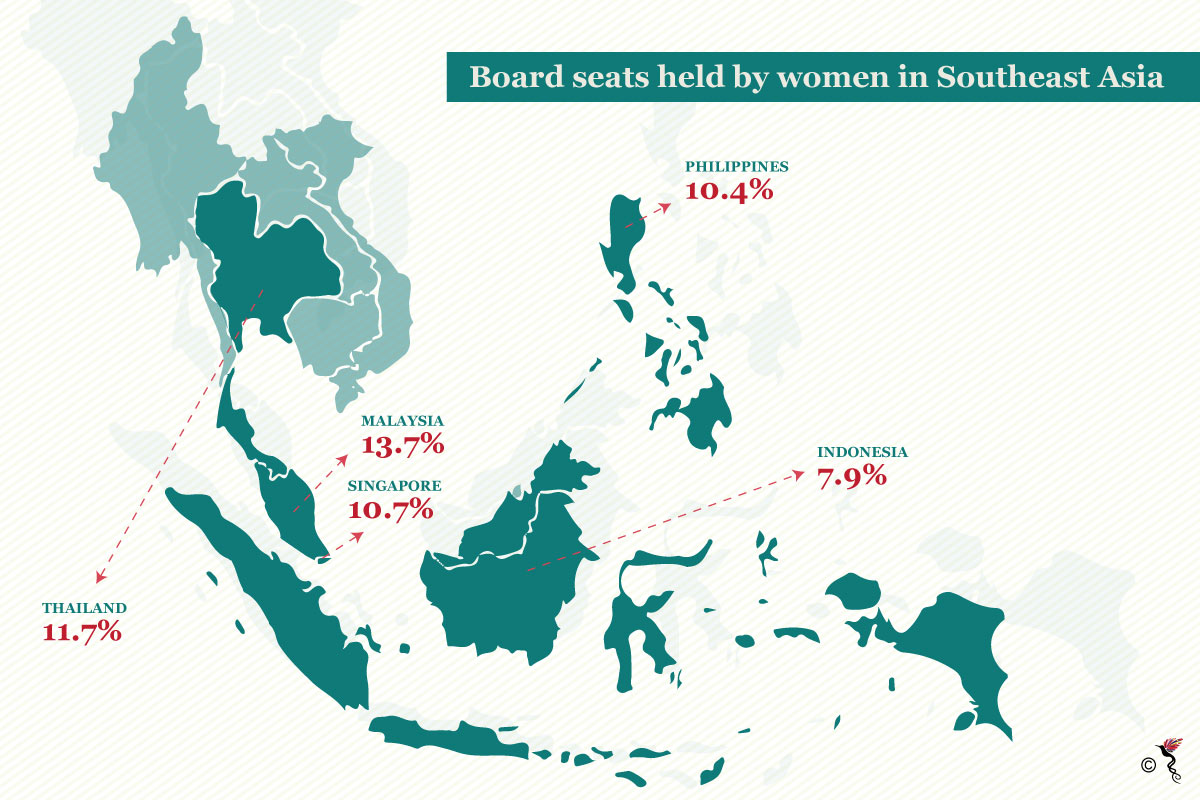Even after 50 years since the formation of ASEAN (Association of Southeast Asian Nations), women representation in boardrooms across Southeast Asian countries is still lagging behind most developed nations. Having a diverse workplace ecosystem – of people and thought – will be important to ensure that board members are exploring challenges from all possible angles and are consistently bringing innovative ideas and point of views to help businesses grow in an increasingly sophisticated marketplace.
According to the fifth edition of Deloitte Global’s "Women in the Boardroom: A Global Perspective", Asian women are still largely under-represented on corporate boards, despite continued efforts to improve gender diversity in boardrooms. The McKinsey Global Institute (MGI) also reported that the ASEAN region could potentially raise its collective GDP (gross domestic product) by 30 percent, or 1.2 trillion dollars, if proper initiatives are taken to address issues that are standing in the way of gender equality in workplaces. Being the centre for economic growth and the seventh largest market in the world, ASEAN needs to start thinking ahead and capitalise on its rapidly-growing women workforce.
The majority of ASEAN companies with women on the board still make up a small number despite a minute year-to-year increase. The reasons which contribute to low levels of representation of women in the boardroom across ASEAN (Association of Southeast Asian Nations) include deep-rooted corporate culture, long working hours and household responsibilities, particularly in raising children.
In his e-mail correspondence with The ASEAN Post, Dan Konigsburg, Senior Managing Director of Deloitte’s Global Center for Corporate Governance stated that, “study after study has shown that more diverse boards are better, more effective boards. The more effective boards a country has the more resilient, and the more sustainable its private sector can be.”

Percentage of women on boards in five ASEAN countries. Source: Deloitte Global’s Women in the Boardroom: A Global Perspective.
Efforts to increase the number of women in the boardroom in ASEAN
In Malaysia, the government has urged companies to have at least 30 percent women in leadership positions in the corporate sector by 2020. Today, only 95 out of 928 public-listed companies have achieved the 30 percent target while 372 companies are still without a single woman sitting on the board. In order to show its commitment to the cause, Malaysia's Prime Minister Najib Razak pledged that in 2018, public-listed companies with no women on their board of directors will be named and shamed while they would risk losing out on government contracts.
To ensure this 30 percent target is achieved under Malaysia's National Transformation Programme, the "30% Club" initiative was launched on May 8, 2015. The 30% Club is a group of chairmen and business leaders who are committed to bringing more women onto Malaysian corporate boards. The Chairmen and board directors recently met for a roundtable engagement on October 10 at the Securities Commission. 30% Club Advisory Co Chair Datuk Mohaiyani Shamsudin stated, “we must keep advocating for diversity in the boardroom, and move towards the country’s targets.”
“With the conviction of the Government, the participation of public and private learning enterprises, the commitment of Corporate Boards, and a pool of qualified women, there should be every chance Malaysia will reach the 30 percent target by 2020,” added Anne Abraham, Executive Co Founding Chair of 30% Club.
Apart from the Malaysian government, the International Finance Corporation (IFC) has also been helping to raise awareness and build a pipeline of qualified female candidates through its Women on Boards Initiative which identifies board diversity as an indicator on the ASEAN Corporate Governance Scorecard – a methodology that assesses the corporate governance of publicly listed companies in six participating ASEAN member countries. In other ASEAN countries, efforts are being made to include more women in boardrooms, but they have yet to set any concrete plans or policies to address this issue.
“Women serving on boards can be an important signal to others in the organisation and to other companies in society. We don’t often think about it, but board membership is a highly visible position, and boards can be influential to others. In this sense, advocating for more women to join boards can be a catalyst to including women and elevating women’s roles more broadly in a society,” Dan added.
